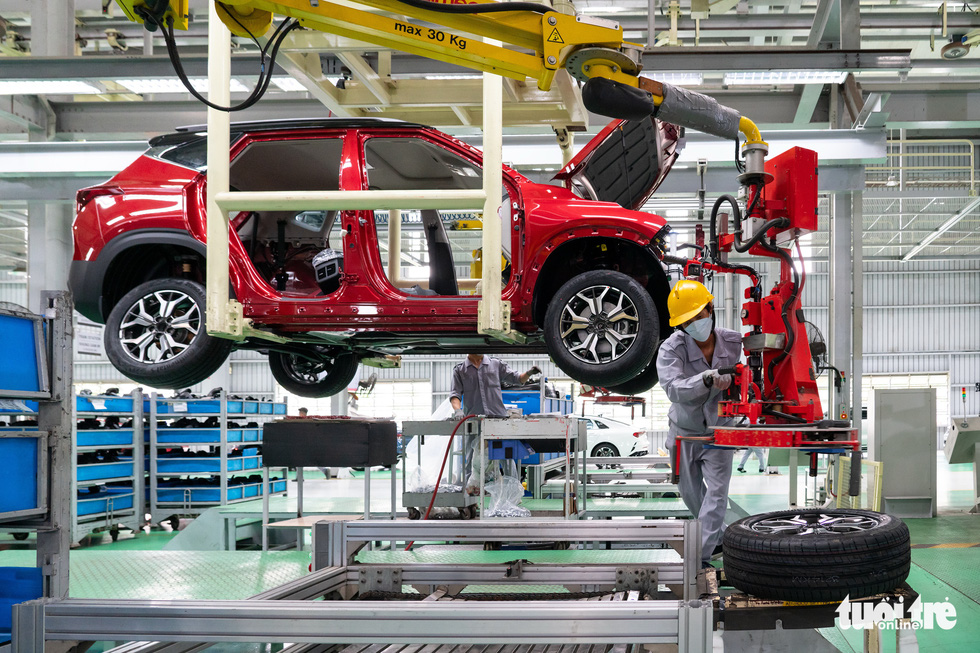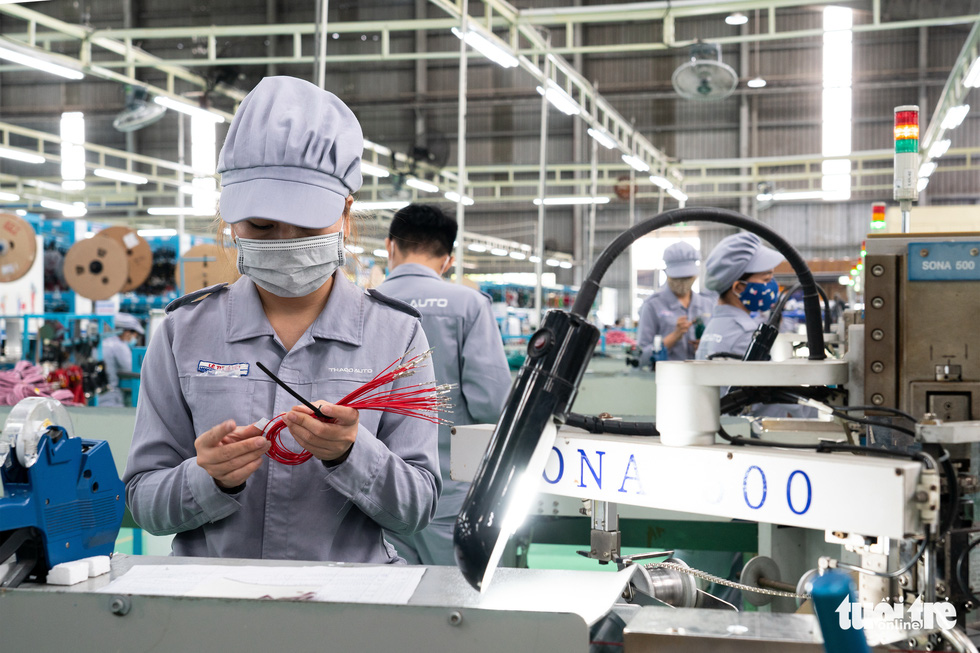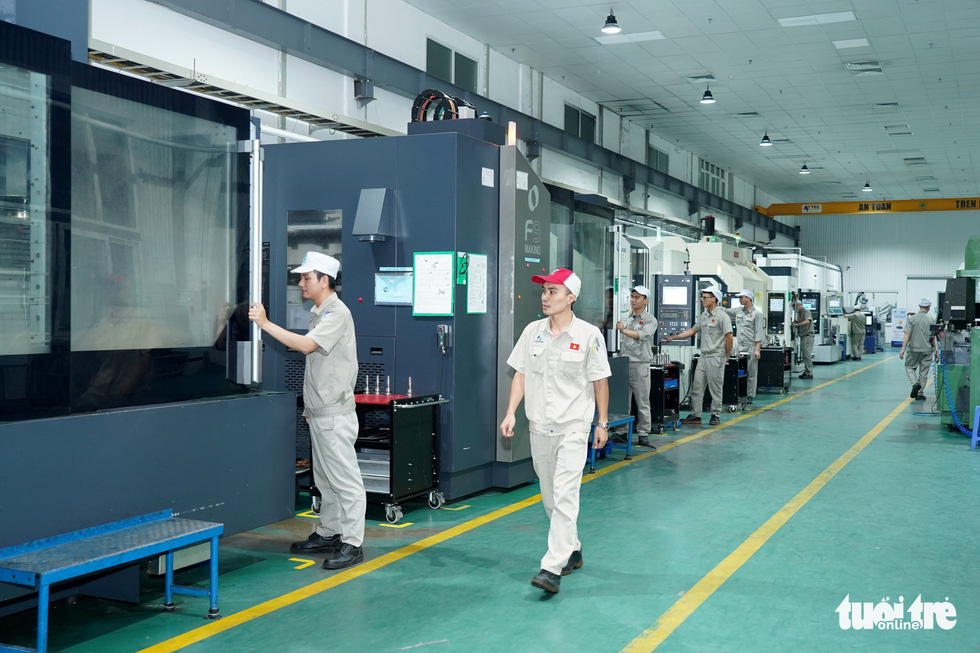Except for enterprises with large investments already involved in global supply chains, a majority of others are on a rocky road to cement themselves.
Stringent standards
In a large factory with many automated phases and robots, workers of Aureole Unit – Devices Manufacturing Service Inc., an arm of Japan’s Mitani Sangyo Group, patiently checked newly-manufactured accessories in the auto sector.
Holding plastic accessories with many designs and sizes, Nguyen Van Tam, director of production at the enterprise, was proud that millions of parts assembled in his factory would be used in automobiles across the world.
Having developed auto accessory factories in Vietnam since 2014, Yoshida Masakazu, CEO of Aureole Unit – Devices Manufacturing Service Inc., said 40-45 percent of the factories’ products were consumed in Vietnam and the remaining were exported to Japan, Europe, and America.
As the manufacturing of accessories requires high standards, the firm has to import 100 percent of plastic beads.
Earlier, it had to import metal accessories, specifically those similar to bolts and screws.
 |
| Workers assemble wheels for Kia autos using a modern system at the THACO Chu Lai Industrial Park in Quang Nam Province. Photo: Huu Hanh / Tuoi Tre |
However, the firm has found domestic supplies of these metal accessories as Japanese firms now produce these products in Vietnam, said Yoshida Masakazu.
He added that recent statistics from Japanese enterprises showed that the localization rate of Japanese firms in Vietnam reached only 36 percent.
Vietnamese enterprises have yet to deeply participate in supply chains because quality standards are strict.
Enterprises that wish to get involved in supply chains must get the agreement of customers, so manufacturers of supporting industry products cannot choose suppliers of their own free will, the Japanese CEO noted.
Having visited many auto factories in Vietnam, Yoshida was surprised that many factories had better machinery than Japanese enterprises.
However, Vietnamese enterprises should invest in the quality in the broad sense of the word.
As a case in point, many Vietnamese companies have obtained quality certificates, but have failed to ensure the quality in reality, from the material purchase, Yoshida said.
Regarding the delivery time commitment, a leader of a foreign direct investment (FDI) firm specializing in manufacturing electronic accessories for export to the U.S. and Europe at the Tan Thuan Export Processing Zone in Ho Chi Minh City said he learned a painful lesson.
Everything was all right. His company placed an order with a local supplier and they reached a consensus that the product would be delivered in four weeks.
However, the supplier later asked for a delay and the product was not delivered after eight weeks, which damaged the prestige of the FDI manufacturer and caused it to be subject to a fine.
Hard to immediately achieve best results
According to Bui Minh Hai, chairman of the director board of Hanoi Plastics Joint Stock Company, despite being a first-tier supplier of Honda, the company is just a second-tier supplier of Samsung.
In reality, to produce a product meeting the requirements of multinational groups, local companies must meet stringent standards, such as having modern and stable production lines, so they must invest heavily in factories and machinery.
 |
| Employees of THACO in Quang Nam Province are at work in an area for automatic electric wire cuts. Photo: Huu Hanh / Tuoi Tre |
In addition, their human resources must be trained systematically. However, Vietnam’s workforce finds it hard to keep pace with new technologies.
Therefore, when taking part in supply chains, Vietnamese businesses cannot immediately become first-tier suppliers but need time to improve their capability.
To take advantage of opportunities, Hai expected the government to pay more attention and invest more in the training of high-skilled manpower and launch financial support packages and incentives for enterprises.
Truong Thanh Hoai, head of the Industry Agency under the Ministry of Industry and Trade, said Vietnamese industrial enterprises’ internal capability remained limited due to their heavy reliance on FDI.
Although the processing and manufacturing sector has been playing an important role, with its contribution to the country’s gross domestic product (GDP) rising from 13 percent in 2010 to 16.7 percent in 2020, Vietnam is in the group of newly-emerging industrial economies because its capability and added value are still low.
According to the Ministry of Industry and Trade, supporting industries meet around 10 percent of the domestic demand.
Local enterprises are able to produce accessories and simple products, with low technologies making up 60 percent, and are using production lines imported in the 1960s-1970s.
Vietnamese enterprises spend an average of 0.5 percent of their revenue renovating technology, while the rate is five percent in India and 10 percent in South Korea.
Therefore, Vietnam was considered unwilling to commit to the fourth industrial revolution and has not taken advantage of new technologies.
A leader of the Ministry of Industry and Trade said policies should be issued early to effectively realize the goal of industrializing and modernizing the country, develop industry, and enhance the country’s self-reliance.
It is vital to build the law on industrial development to pave the way for enterprises to grow in value chains, the ministry added.
Policies needed are those to improve the State apparatus for industrial development, clarify the management responsibility, promote the application of science and technology in industry, improve the internal strength of Vietnamese enterprises, bolster the connectivity among regions, and create industrial spaces.
Do Thi Thuy Huong, a member of the executive board of the Vietnam Electronic Industries Association, said local firms found it hard to make use of the foreign investment shift into the country and get involved in supply chains.
When FDI enterprises come to Vietnam, their suppliers also enter the market.
The high-quality manpower which has been scanty will be attracted by FDI enterprises due to their better policies.
In addition, the rentals for land in industrial parks as well as the costs for construction, warehouses and materials have surged.
Therefore, Huong threw her support behind the viewpoint that policies are needed to boost the development of the domestic industry, facilitating Vietnamese firms.
More practical support needed
According to many mechanical enterprises, they have striven to maintain their operations. Therefore, it is a must to have a specific study on Vietnam’s advantages and opportunities, even information about foreign enterprises’ demand for partners.
To keep pace with trends, forecasts must be made so that domestic firms can get ready for investments, not preparing machinery and equipment after securing orders.
|
|
Like us on Facebook or follow us on Twitter to get the latest news about Vietnam!


















































